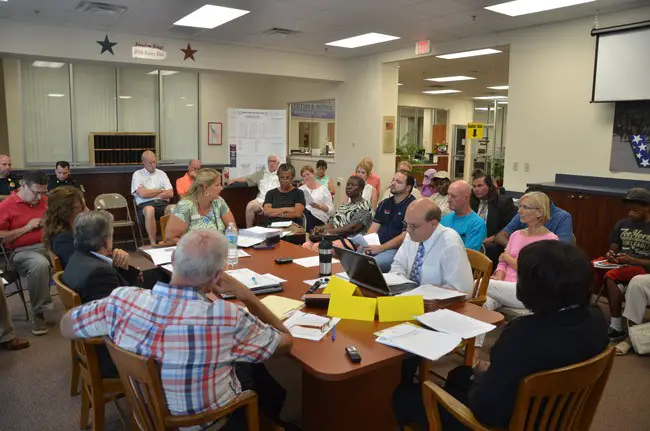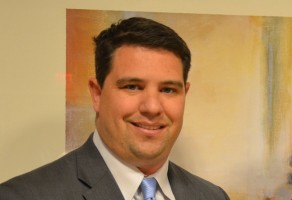
County canvassing boards convene just before, during and just after every election to provide oversight and ensure that elections are conducted impartially and lawfully. Those board meetings rarely make news. If they do, something is amiss—either because an election is unusually close and contested, or because something has gone awry with the electoral process.
In 2014, Flagler County Canvassing Board meetings repeatedly made news for neither of those reasons. They did so because then-County Supervisor of Elections Kimberle Weeks became the news.
Weeks turned meetings into a platform for numerous accusations against various government agencies, even as the elections themselves—the primary and the general—went smoothly. The meetings stretched to unheard-of lengths, caused immense distractions and eventually led to charges and counter-charges, with Weeks filing ethics and elections complaints against members of the canvassing board and the county attorney, and, eventually, the Florida Department of Law Enforcement investigating Weeks and a grand jury indicting Weeks on 12 felony charges, most of them stemming from controversies at the canvassing board: she had allegedly illegally and secretly recorded others, a third degree felony in Florida.
None of the conflicts swirling around Weeks reached the intensity of her attacks on the county attorney—in this case, Al Hadeed—who was also the canvassing board attorney. Weeks never recognized Hadeed as the board attorney. She hired her own, without board approval, and paid for that attorney out of the supervisor’s budget, again without board approval. Hadeed on many occasions attempted to diffuse conflicts on the board by doing what canvassing board attorneys are supposed to do: explaining the parameters of the board’s responsibilities. Weeks, however, not recognizing his input, would either call on her own attorney to weigh in or, more often, make legal calls of her own, triggering further conflicts and distractions.

The controversies and news coverage surrounding the Weeks era inspired the bill, Hutson said. “When I looked at the actual state law there was some question as to the clarity of who represents the canvassing board,” Hutson said. All 67 counties have a county attorneys, he said, all are salaried, having them provide counsel to the canvassing board “would be the cheapest way without having to name an attorney to each board.”
With the proviso that two of the three canvassing board members can always designate another attorney, that would ensure flexibility and clarity in the law, Hutson said. “It’s pretty narrowly drafted and very clear as to what we’re trying to do,” he said. “This bill will prevent future wrangling over legal counsel at the cost of the taxpayer and allow the canvassing board to concentrate on their important task.”
Rep. Paul Renner, whose House district includes all of Flagler County, is expected to file a companion bill in the House. “By removing any ambiguity, Sen. Hutson’s legislation will improve the orderly administration of our elections and prevent one member of the canvassing board from creating deadlock over who should serve as legal counsel for the canvassing board,” Renner said in a news release issued by Hutson’s office, in a direct reference to Weeks.
Kaiti Lenhart, who was appointed Flagler County Supervisor of Elections in the wake of Weeks’s resignation, says she is supportive of the Hutson proposal, understanding that it preserves flexibility.
“If there’s a majority vote for the canvassing board attorney, then it seems that would be a proper process,” Lenhart said. “That’s what’s most important to me, it’s not explicitly saying the county attorney is the board attorney and there’s no other option.” Lenhart added, “It’s not uncommon for supervisors to rely on counsel from an outside source other than a county attorney, and that’s something I’ve learned just asking around.” Boards do so because often their own county attorney may not be versed in election law.
Hadeed, who’d not yet seen the Hutson proposal, said that years ago, in the 1970s or earlier, the law had specified that the county attorney would be the canvassing board attorney, but that specification was removed. “In many counties however the county attorney does not do the work, the canvassing board actually retains its own counsel,” Hadeed said. “That’s typical in the larger counties, but I don’t want to say it’s across the board. The practices vary.”
Either way, the board attorney is not in any way in a decision-making position. The attorney’s function is to take the standards promulgated by law, by Division of Elections rules and opinions, “and bring those to the attention of the canvassing board,” Hadeed said. It’s up to the board members to take or leave that guidance. “The attorney has no role in physically examining ballots, though the board can ask the attorney to look—not handle or touch—at a ballot to guide the board on the protocols of the division of elections.” Those protocols are very extensive, including a 400-page manual, “so it is a large body of information, and what the attorney does in that situation is to cull out what might be relevant to the canvassing board in fulfilling its responsibilities.”
Hutson has not yet contacted the state association of supervisors of elections. Brian Corley, president of the association, did not return a call or an email Tuesday afternoon.
Hutson said he did hear one note of concern from the Miami-Dade County supervisor, who suggested that the proposal could give the county more power on a canvassing board. (Hadeed said that shouldn’t be the case, since the attorney has no authority beyond guidance on the board.)
“I’m hoping we have a good chance on this one,” Hutson said. “It’s pretty simple the way I wrote it, and with the choice there, the two thirds vote, it allows more flexibility. Until I hear from other supervisors and other organizations that would be for or against this, we’re just in the filing stage, so I don’t know where the concerns would come from.”





























Footballen says
Wacko Weeks, another horrible decision by Flagler County voters.
Anon says
Kimmy and her antics are like the hemorrhoid that will not go away….
Layla says
How many have ever lived in a community where the ballots are counted by the politicians? Not many, I’d bet, unless of course you moved down here from New Jersey!